Today the Romanian edition of River of Smoke is to be released in Bucharest. I had hoped to be there for the occasion but sadly it was not to be. Romania is not yet a part of the Schengen area, so Indians need visas to enter the country. In August this year I went to the Romanian Consulate in New York to apply for a visa. I am sorry to say that I had a most unfortunate experience. That is why I cannot be in Bucharest today.
When my Romanian publisher Adelina Patrichi (of Editura Raj) announced that my visit had been cancelled there was a strong response from the Romanian press. I am told that all the major Romanian nespapers and TV stations carried reports (a list of links is included at the end of this post). Adelina Patrichi and I also received many letters of support from my readers. I was deeply touched by this.
Subsequently Bianca Felseghi, a Romanian journalist, asked me for an email interview. In answering her questions I tried to explain what happened. I also described my family ties with Romania and the great warmth I feel for that country. The interview is to be published in Romania today, in translation; the English text is posted below (with a few pictures).
Once again I would like to express my gratitude to my Romanian readers. I was truly touched by their support and I hope I can return to Romania again soon.
1. Mr. Ghosh, I’m really sorry for your unfortunate experience with the General Consulate of Romania in New York. Could you, please, show us the reasons why, after meeting the Romanian authorities you decided on canceling your visit in Bucharest? Can your visit be rescheduled?
A. It is indeed an unfortunate story.
I was invited to visit Bucharest by my Romanian publisher, Adelina Patrichi (of Editura Taj) for the publication of my book River of Smoke. Adelina was careful to lay the groundwork for the visit. She wrote numerous letters to the Romanian consulate in New York, where I was planning to apply for the visa, and also sent me all the necessary paperwork (the requirements are quite stringent for those with Indian passports).
Unfortunately on the day when I went to the Consulate to apply for the visa, I happened to run into an individual who was extraordinarily rude and confrontational, right from the start. When I told her why I was planning to travel to Romania, she berated me for not bringing a copy of the translation of my book. I tried to explain to her that the book had not yet been published and I did not have a copy; I also told her that Adelina (my publisher) had written to the Consulate to explain why I needed to travel to Romania. Her answer was: ‘How can I trust your publisher? I don’t know her. I cannot give you a visa without examining the book and seeing what kind of book it is.’
It was as if she were a censor or something. The fact that Adelina had written to the Consulate seemed to add to her annoyance. Her attitude was: ‘How dare she (Adelina) write directly to the Consulate? Who does she think she is?’
It was like dealing with a commissar from the Iron Curtain era – and that is exactly what I told her, when I took my papers back and walked out.
It was clear to me that she was determined to find some pretext to either deny or hold up the application. I was, in any case, pressed for time, so in the end I decided that it would not be possible to go through with the application in the time available to me.
Afterwards, in consultation with Adelina and my literary agents, I tried to think of various ways in which the issue might be resolved. But every expedient that we could think of involved some degree of uncertainty. Since my travel schedule over the next few weeks is very tight, we thought it best to cancel this leg of my tour. Of course, since Adelina had already announced my visit, she also had to announce the cancellation. When she posted the notice on Facebook, there was a strong reaction in Romania. There were articles in the newspapers and many readers wrote letters of protest. I was deeply touched to learn of this.
I would like to say that I knew right from the start that this incident was caused solely by the attitude of one individual (there are plenty of bad-tempered bureaucrats in India, so I have some experience of these matters). Since then the Romanian Consul in New York, Mr Marian Parjol, has written me a very gracious letter of apology, in which he explains that this individual has a history of misbehaviour. I deeply appreciate his consideration: it is quite remarkable that an arm of the government should be so responsive to public opinion.
Mr Parjol and others in the Romanian Foreign Ministry have also very kindly offered to make alternative arrangements. I would have liked to avail of their help, but unfortunately it is too late to re-arrange my schedule again at this point. But I do very much appreciate their offers of assistance.
I am grieved that I will not be able to meet my Romanian readers this time around. Their response to the cancellation of my visit means a great deal to me – I hope I will be able to meet them on some other occasion soon.
2. You recently declared on BBC that you have relatives in Transylvania. Can you talk about your liaisons with Romania? Have you ever visited our country before this episode?
A. I do indeed have relatives in Romania – the story is, in an odd way, the inverse of the story of Mircea Eliade’s relationship with Maitreyi Devi (as described in Eliade’s novel ‘Bengali Nights’).
In the 1960s my first cousin, Shuvendu Basu Roy Chowdhury (I called him Khokon-da) won a scholarship to study engineering in Graz, Austria (like Maitreyi Debi he was from Kolkata). At the university he met and fell in love with a refugee from Romania who was also studying in Graz. As it happens she was Katalin Countess Mikes de Zabola. They married and had two sons.
Katalin belongs to an old Transylvanian family. They are of Hungarian (Székler) origin and have been involved in politics and literature for many centuries. As their website explains: ‘Exile, imprisonment, torture and dispossession have been characteristic of all generations of the family at all times. Two brothers of the Mikes family found even their place in Hungarian folk romance literature after they had kidnapped the daughter of a well-known (protestant) family in 1634; their properties were subsequently confiscated by the government. (“Özvegy és leánya” “The widow and her daughter” from Zsigmond Kemény). Count Benedek Mikes … was sentenced to death when he and his brother deployed an army against the Habsburg monarchy in 1848/49; he fled the country and returned to Zabola twelve years later via Geneva, Paris and Bulgaria…. His brother, Count Kelemen Mikes, who had become a Hussar colonel died at the age of 29, hit by the first cannon ball fired by the Russian army in 1849. He became a martyr to the Székler resistance movement. A few of them were also involved in cultural issues such as Kelemen Mikes. Born in Zabola/Transylvania in 1690 he became freedom fighter against Habsburg rule, escaped to Poland, France and at last Turkey. He became famous after writing “Letters from Turkey” in Rodosto where he lived in exile with the Transylvanian Prince Rákoczi until 1761. With his letters from Rodosto, Kelemen Mikes laid the foundations of the Hungarian prose literature, and he is regarded as the first Hungarian prose writer. A plaque was erected on the lot on which the house where he was born once stood, and in the park of Zágon Manor stand the two old oak trees, which, people say, he planted. The two statues of Rákoczi and Mikes can still be found in Rodosto.’
During the Communist era the Mikes estates were confiscated once again and the family was driven into exile. Katalin’s experience was, in a way, mirrored by my cousin’s. He was from a landowning family in Bangladesh and they lost some of their properties when the Indian subcontinent was partitioned in 1947. The experience of displacement was, I think, a bond between them.
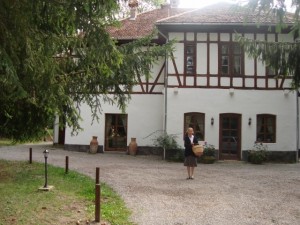
After the fall of Ceausescu, in 1990, when estates were being returned to their former owners, it was my cousin Shuvendu who took the initiative in reclaiming Katalin’s property.
For many years he traveled back and forth between Graz and Bucharest. Eventually his persistence paid off and the estate was restored to Katalin. But sadly Khokon-da died shortly after the estate was returned so he was not able to live there. Today the estate, Kastely Mikes in Zabola, is run their two sons, Gregor
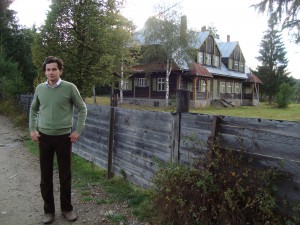
and Alexander von Mikes Roy Chowdhury. They are doing some interesting experiments in sustainable farming and forestry on their lands.
They have turned one of the cottages
on the estate into a wonderful little bed-and-breakfast. They serve produce that is grown on their land, including amazing wild mushrooms (you can read all about it on their website www.zabola.com). At the same time Gregor and Alexander have also kept up their links with India and Bangladesh.
They are actively involved in restoring parts of their ancestral village in Bangladesh (which happens also to be my mother’s ancestral village) – Ulpur. They have also maintained their family’s literary interests. Gregor’s wife Szolna,
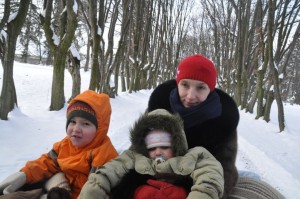
who is also from Transylvania, is a best-selling writer in Hungarian.
My wife and I visited Zabola in 2009. It was a completely magical trip. Zabola itself is an enchanting place,
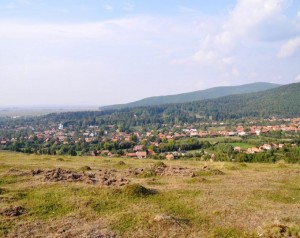
surrounded by thousands of acres of pine forest. But we were also amazed by some of the nearby towns and castles, particularly Brasov, which is, in my opinion, one of the most beautiful and unspoilt cities in Europe.
It was wonderful also to visit the sites that are associated with the legends of vampires, particularly Bran Castle.
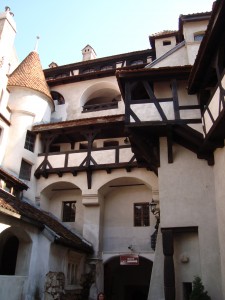
In a way it was like visiting a lost Europe, with horse-carts bowling along the roads
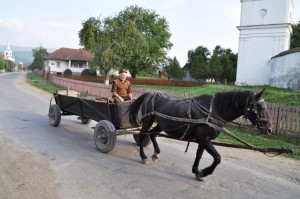
and laden apple trees everywhere.
Since then we always tell everyone we meet that they must go to Romania to visit these wonderful places.
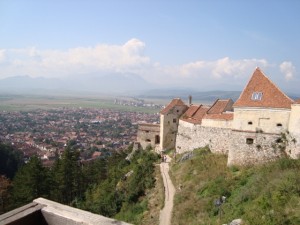
Some day when I have time, I would love to return to Zabola.
I would also love to visit the Danuba delta – it would be exciting to compare this with the delta of Bengal, which I have written about in my book The Hungry Tide (which will soon be published in Romanian by Taj).
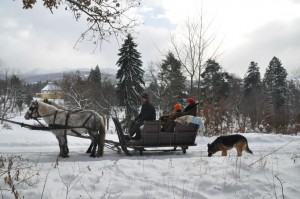
3. I understood you lived in India during the same time with Maitrey, the famous character of Mircea Eliade’s novel. Have you met Maitrey? Did you know about her, about her being an inspiration for Eliade’s work?
A. Maitreyi Debi was a famous writer so I do of course know about her and her story. But I am sad to say that I never met her.
4. Do you have a specific writing ritual, do you write every day or do you have inspirational moments? I read that you don’t use computers and you prefer handwriting. Is it true? Will you let us know why? Do you have a specific writing instrument that you use?
A. I write my first couple of drafts with a fountain pen. I’m very particular about my pens – after all they are the basic tools of my work. The paper has to be just right too. Quite often I’m in places where I can’t get satisfactory paper and it always upsets me. After the first couple of drafts I start typing on a PC. I go through so much paper that I always print on both sides. It often happens that I end up printing one manuscript on the verso of the other. So my first print-outs of Sea of Poppies had my drafts of The Hungry Tide on the other side.
5. The action you imagined in the novel “Sea of poppies” takes place during the Opium War. Why did you chose that time and how long did the research for the novel last?
A. The first Opium Wars were a critical moment in world history. They have had a deep impact on two of the most important countries of today’s world – India and China. In the not-too-distant future I think people will recognize that the Opium Wars have played a critical role in shaping the contemporary world. Unfortunately much of this history has been forgotten in India – but in China it is still a vivid memory.
Sea of Poppies took about four years to write. Although it describes an epic journey the narrative is actually quite simple: it is just a voyage on a ship. But when one thinks of the very different circumstances and trajectories that bring different characters into the same vessel, that journey acquires many different dimensions – so many that it would be impossible to embark on the project if there wasn’t a basic simplicity and coherence to it.
6. Did you plan to write a trilogy or you started to love your characters and decided to write two more books? You have any favourite character in the Sea of Poppies? How about in the Glass Palace or in the River of Smoke (you should have launched this autumn in Romania)?
A. The trilogy will follow the lives and careers of some of the characters in Sea of Poppies. Indian migrants used to speak of people they had traveled with as ‘jahaz-bhais’ – ‘ship brothers’. The trilogy is thus the story of an extended family – one that is brought into being by the shared experience of being in a ship.
7. Some say in your novels they can clearly feel resentment against British colonialism, specifically its hypocrisy about modernizing India. Do you believe, however, that there were good parts throughout colonialism and if so, what were those?
A. Colonialism was certainly the dominant political reality of 19th century India, but it is important to remember that it was just one aspect of that reality: people also lived and laughed and loved, as indeed people do everywhere no matter what their political circumstances. When I look back at the 19th century, what strikes me is the resilience, the resistance, the willingness to change and the determination to learn. The past cannot, and ought not to, be planed down to any one dimension. As readers will see, there are so many different stories unfolding simultaneously in ‘Sea of Poppies’ that it is impossible to impose one over-riding narrative on the collective journey. But to acknowledge that the past is complicated, is not to say that we should turn our backs on it, either in shame, or because we just want to move on. One reason for this is that colonialism is not really in the past, even in the Indian subcontinent: Pakistan, for instance, is dealing with a situation that is strongly reminiscent of the colonial past. The present incarnation of Empire is in fact uncannily like the old one, with its island prisons, its vast network of jails, its ‘cantonments’, and most of all its tireless trumpeting of its good intentions.
Viewed against this context the question of the ‘good parts’ of colonialism becomes very troublesome: this is because the question is not really about the past. It is about the present – and if an answer is provided, it will be used to justify colonialism today. Present-day colonialism derives its charter from the past: it wants us to give our assent to a certain view of history so that this history can be repeated (as it has been in Iraq). There is not much we can do about the past, but it is certainly within our power to withold our assent in the present day – not in order to seek retribution for what happened, but as Gandhi famously said, to make sure that it does not happen again.
________________________
Links to articles in the Romanian press:
http://www.mediafax.ro/

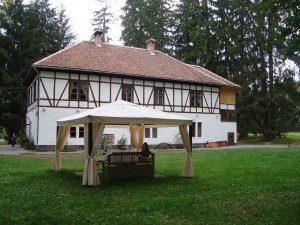
Wonderful post on one of my favourite countries, unfortunately remains unvisited after ’80, when I was there on my “honeymoon” voyage. I wish there were more tourism between Rumania and India, in many ways, the present political situation is sadly like what it was in Rumania in the ’80s.
You mention the delta of the Danube – interestingly, we sailed the good ship SATYA SOHAN up the Danube to Galatz/Galati. It was interesting to note how, once we anchored in the river for the night, there was a lot of barter traffic not just up and down the river but also across.
I could do an artiicle on that passage, our encounter with gypsies, and the political situation of those days – we were there for two months. Country in flux – and its meaning, understood it even more when we went to Poland next.
Best/VM
You MUST write about these experiences! Let me know when you do…
A
What a wonderful post and what an extraordinary story about the relations in Romania. I have a very good friend who is from Siebenbürgen (Transylvania) although she is not Transylvanian herself, but Romanian. That estate looks so glorious; I want to visit there now.